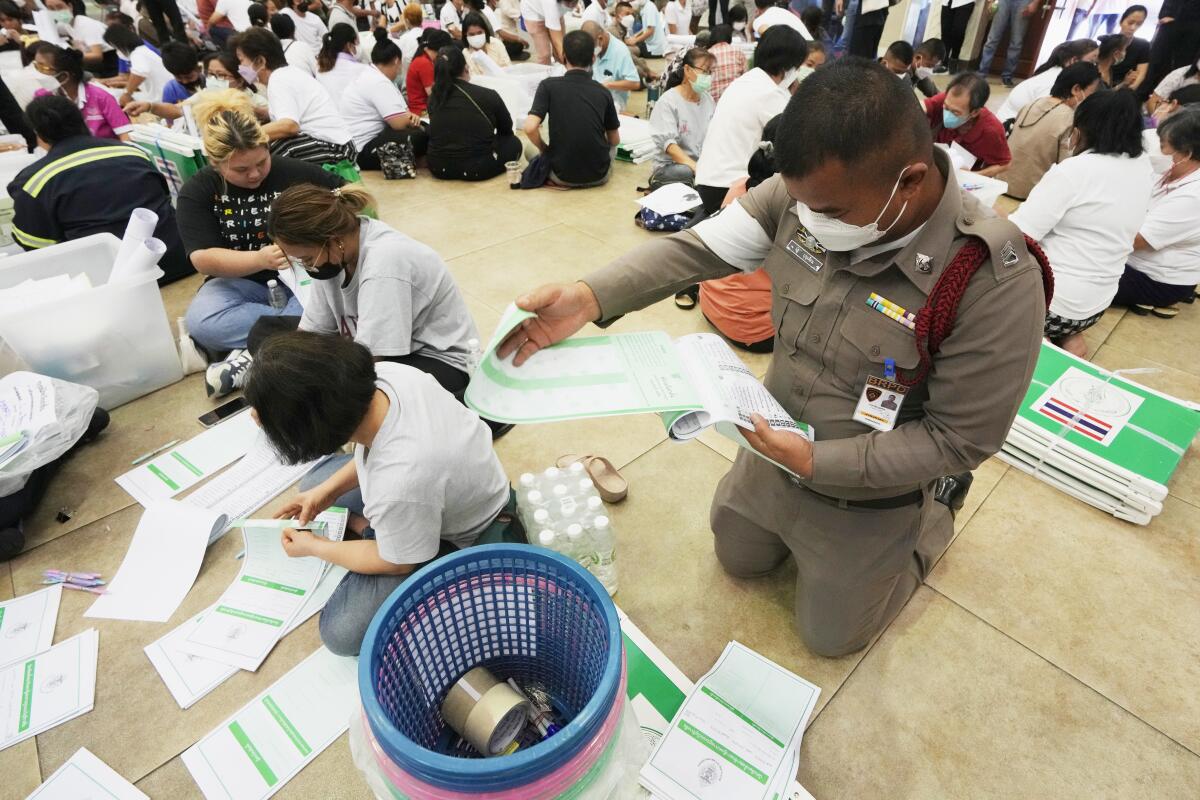Thai election is underway, with opposition favored to top polls

- Share via
BANGKOK — Voters in Thailand were heading to the polls Sunday in an election touted as a chance for change, eight years after incumbent Prime Minister Prayuth Chan-ocha came to power in a 2014 coup. He is running against the daughter of the politician who is the military’s top nemesis.
The opposition Pheu Thai Party, headed by Paetongtarn Shinawatra, is widely predicted to win at least a healthy plurality of the seats in the 500-member lower House.
But who heads the next government won’t by decided by Sunday’s vote alone. The prime minister will be selected in July in a joint session of the House and the 250-seat Senate. The winner must secure at least 376 votes, and no party is likely to do that on its own.
Pheu Thai won the most seats in the last election, in 2019, but its archrival, the military-backed Palang Pracharath Party, succeeded in cobbling together a coalition, with Prayuth as prime minister. It relied on unanimous support from the Senate, whose members share the military’s conservative outlook and were appointed by the military government after Prayuth’s coup.
Thailand’s military appointed the election commissioners. It repeatedly postponed voting day.
Prayuth is running for reelection, although the military this year has split its support between two parties. Prayuth is backed by the United Thai Nation Party; his deputy prime minister, Prawit Wongsuwan, another former general, is the standard-bearer for Palang Pracharath.
Prayuth has been blamed for a stuttering economy and shortcomings in addressing the COVID-19 pandemic, as well as the thwarting of democratic reforms, a particular sore point with younger voters.
“The increased youth vote and general awareness of the damage caused by military rule are key factors likely to determine the results of this election,” said Tyrell Haberkorn, a Thai studies specialist at the University of Wisconsin. “After nine years of military rule, people are ready for a change, even those who were not interested in rocking the boat before.”
Pheu Thai is the latest in a string of parties linked to populist billionaire Thaksin Shinawatra, who was ousted as prime minister by an army coup in 2006. Paetongtarn is his daughter. Her aunt, Yingluck Shinawatra, who became prime minister in 2011, was toppled in the coup led by Prayuth.
Pheu Thai and Paetongtarn, the most popular of the party’s three registered candidates for prime minister, are strides ahead of the competition in opinion polls. But there is no sign that the country’s military-backed conservative establishment has warmed to them.
Start your day right
Sign up for Essential California for the L.A. Times biggest news, features and recommendations in your inbox six days a week.
You may occasionally receive promotional content from the Los Angeles Times.
“I think the conservative-royalist side — underpinning the military, the monarchy — their backs are against the wall. Change is coming, and they have to find a way to deal with it,” said Thitinan Pongsudhirak, a political scientist at Bangkok’s Chulalongkorn University.
That means Pheu Thai will have to tread carefully after Sunday’s election in choosing possible coalition partners.
The Move Forward Party is polling in second place and is its ideological bedfellow in seeking to clip the military’s wings. But its outspoken support for minor reforms of the monarchy is unacceptable to most conservatives, to whom the institution is sacrosanct, and scares off other possible coalition partners.
Many believe Pheu Thai might look in the other direction for a partner by cutting a deal with the Palang Pracharath Party and its leader, Prawit, who is less associated with the 2014 coup and the hard line Prayuth has pursued.
More to Read
Sign up for Essential California
The most important California stories and recommendations in your inbox every morning.
You may occasionally receive promotional content from the Los Angeles Times.













